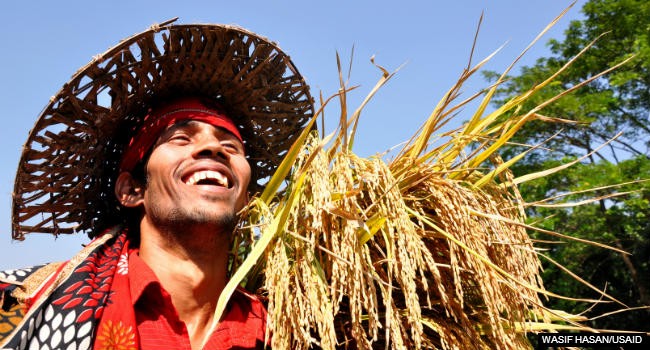
At USAID, we partner with Bangladesh to improve the availability and access to nutritious, domestically produced foods. Through the U.S. Government’s Feed the Future initiative, USAID programs improve food security, economic growth and nutrition to address hunger and end poverty in Bangladesh.
USAID utilizes the power of technology and innovation to boost agricultural production and ensure that Bangladeshis have better access to nutritious food. To do so, USAID trains farmers to use good quality seeds, use fertilizer more efficiently, and irrigate their fields more effectively to increase their yields. We also help increase the production of fish and shrimp. USAID supports research on biotechnology to develop crops that have improved resistance to pests, and partners with institutions to develop varieties of rice that are higher yielding and more tolerant to floods, soil salinity and drought.
Increasing incomes is just as important to food security as production. To address this, USAID connects small farms to regional markets, helping the poorest populations become more active in growing and selling products. This also raises famers’ overall competitiveness and increases their income to purchase food as a result.
In Bangladesh, diets typically lack diversity and are heavily reliant on rice. In conjunction with the Global Health Initiative and the Feed the Future program, USAID improves nutrition by promoting exclusive breastfeeding for mothers and children during the first six months after birth, encouraging people to consume a wider array of nutrient-rich foods, and providing vitamin A and iron supplements. Community education initiatives also increase people’s knowledge of healthy eating practices, hygiene and sanitation, and encourage them to seek basic healthcare.
In 2015, USAID programs in Bangladesh
- Helped 2.1 million farmers boost their production by adopting improved agriculture technologies such as fertilizer deep placement, and higher yielding stress tolerant varieties of seeds.
- Conducted more than 12,600 demonstrations on high-yielding, saline and flood tolerant rice varieties, and new varieties of wheat and maize.
- Provided training and promoted the use of high quality fish and shrimp varieties and fingerlings, resulting in $127 million in incremental sales of fish and shrimp.
Twice the Rice is the story of Taraoni, a rice farmer from rural Bangladesh. Growing up, Taroni’s father often said to him, “Son, rice is our life. Rice is everything.” With improved farming skills he learned from Feed the Future, Taroni is now yielding twice the rice from the same piece of land. As a husband and a father of two children, Taroni’s boosted yields and the resulting higher income is improving his family’s future. He is now able to provide options for his children to go into any profession they desire.








Comment
Make a general inquiry or suggest an improvement.